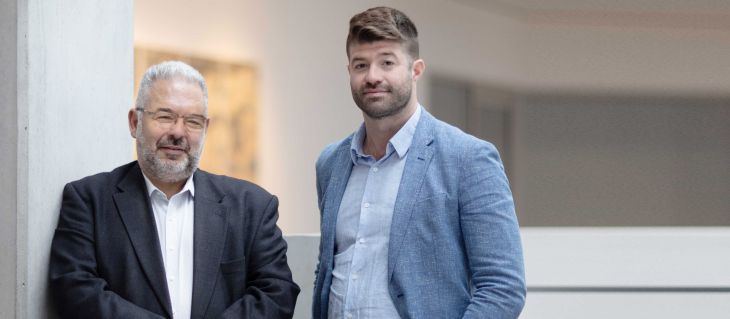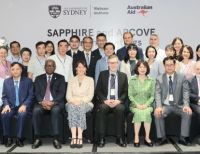,-dr-hugh-marston-(boehringer),-assoc.prof-michael-bowen-(usyd-psychology,-bmc),-hugh-alsop-(kinoxis)-at-the-chau-chak-wing-museum,-university-of-sydney.-03may23.-photo-stefanie-zingsheim.jpg/_jcr_content/renditions/cq5dam.web.1280.1280.jpeg)
From left: Professor Michael Kassiou (School of Chemistry), Dr Hugh Marston (Boehringer), Associate Professor Michael Bowen (School of Psychology) and Hugh Alsop (Kinoxis) in the Chau Chak Wing Museum. Photo: Stefanie Zingsheim
Kinoxis was established to commercialise discoveries of novel molecules with the potential to treat a range of psychiatric disorders. Associate Professor Bowen received the 2021 Prime Minister’s Prize for New Innovators in recognition of his scientific leadership at Kinoxis.
He said: “I've spent nearly 15 years researching the oxytocin system as a potential target for developing new treatments. It’s truly special to be partnering with a leading global pharmaceutical company that shares our vision for its potential to transform the way we treat disorders of the brain and mind.
“This outcome demonstrates what can be achieved through industry-university partnerships. Co-founding Kinoxis and providing scientific leadership for the company and its partnership with the University has been the highlight of my career.”
The partnership will bring significant funding to the University to support further research in the School of Chemistry, School of Psychology, and the Brain and Mind Centre that will be conducted in close collaboration with experts from Boehringer Ingelheim and Kinoxis.
University of Sydney Vice-Chancellor and President, Professor Mark Scott, said: “This major partnership between University of Sydney spinout Kinoxis and Boehringer Ingelheim is a shining example of why the University is so committed to supporting research translation and commercialisation and the innovators who want to bring their ideas to life.”
Professor Kassiou said: “More than three million Australians suffer from illnesses that impair social functioning. The oxytocin receptors in the brain have emerged as an attractive drug target but they have been intractable with small molecules.
“More than 10 years ago my group began investigating the chemistry and pharmacology relating to the oxytocin receptor. We have discovered several series of small molecules, now licensed to Kinoxis, that have allowed us to target the oxytocin receptor in ways not previously possible.”
“As lead inventor and co-founder of Kinoxis I am proud of what has been achieved.”
















